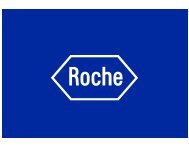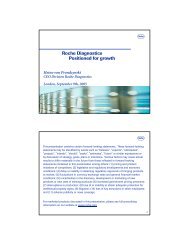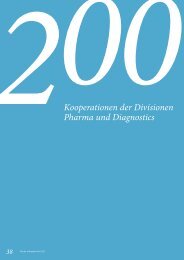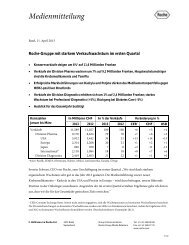Transforming the future of cancer treatment Oncology ... - Roche
Transforming the future of cancer treatment Oncology ... - Roche
Transforming the future of cancer treatment Oncology ... - Roche
You also want an ePaper? Increase the reach of your titles
YUMPU automatically turns print PDFs into web optimized ePapers that Google loves.
PI3K signaling<br />
The phosphatidylinositol 3-kinase (PI3K) pathway is critical for cell survival and cell growth, and can<br />
be activated by growth factors binding to cell surface receptors. It is an intricate signaling cascade that<br />
is among <strong>the</strong> most frequently activated pathways in <strong>cancer</strong>. PI3K is composed <strong>of</strong> a catalytic subunit<br />
that confers enzyme activity, and a regulatory subunit that binds to both cell surface receptors and to<br />
<strong>the</strong> Ras protein. The p110 alpha catalytic subunit <strong>of</strong> PI3K as well as <strong>the</strong> Phosphatase and Tensin<br />
homolog tumor suppressor, PTEN, a negative regulator <strong>of</strong> this pathway, are commonly mutated in a<br />
wide range <strong>of</strong> human tumors. Additionally, many cell surface receptors that activate PI3K are subject<br />
to undergoing mutation or amplification in tumors. Because PI3K signaling can affect many cellular<br />
processes, dysregulation <strong>of</strong> <strong>the</strong> PI3K pathway is a key step in tumorigenesis. 1 Abnormal PI3K signaling<br />
may lead to <strong>the</strong> following 1 :<br />
• Abnormal cell growth<br />
• Increased/uncontrolled proliferation<br />
• Increased cell survival<br />
• Enhanced <strong>cancer</strong> cell motility<br />
Receptors<br />
PI3 kinase inhibitor (GDC-0941, RG7321)<br />
gRED<br />
Components <strong>of</strong> <strong>the</strong> PI3K pathway are frequently mutated or amplified in a broad range <strong>of</strong> <strong>cancer</strong>s.<br />
Developing novel molecules that effectively and specifically block <strong>the</strong> PI3K pathway may inhibit <strong>the</strong><br />
proliferation and growth <strong>of</strong> tumor cells and sensitize <strong>the</strong>m to apoptosis. 2<br />
In preclinical studies, <strong>the</strong> PI3K inhibitor GDC-0941 exhibited selectivity for PI3K over o<strong>the</strong>r kinases and<br />
inhibited activation <strong>of</strong> downstream signaling components in <strong>the</strong> PI3K pathway. GDC-0941 leads to cell cycle<br />
arrest and apoptosis in certain human tumor cell lines. In preclinical studies, when administered as a single<br />
agent or in combination <strong>the</strong>rapy with o<strong>the</strong>r anti<strong>cancer</strong> agents, GDC-0941 has demonstrated significant<br />
antitumor activity. 2<br />
PI3 kinase/mTOR inhibitor (GDC-0980, RG7422)<br />
gRED<br />
Inhibition <strong>of</strong> both PI3 kinase and mTOR may provide a more efficient blockade <strong>of</strong> <strong>the</strong> PI3K pathway<br />
and may prevent development <strong>of</strong> resistance as well. 3,4 In preclinical studies, <strong>the</strong> PI3K inhibitor GDC-0980<br />
exhibits selectivity for PI3K and mTOR over o<strong>the</strong>r kinases and inhibits activation <strong>of</strong> downstream signaling<br />
components <strong>of</strong> <strong>the</strong> pathway. GDC-0980 leads to cell cycle arrest and apoptosis in certain human tumor<br />
Tyrosine<br />
kinase<br />
domain<br />
p85<br />
p110<br />
PI3K<br />
PIP 2<br />
PIP 3<br />
PTEN<br />
cell lines. 5<br />
Akt<br />
mTOR<br />
Caspase<br />
Cell growth<br />
Apoptosis<br />
23

















